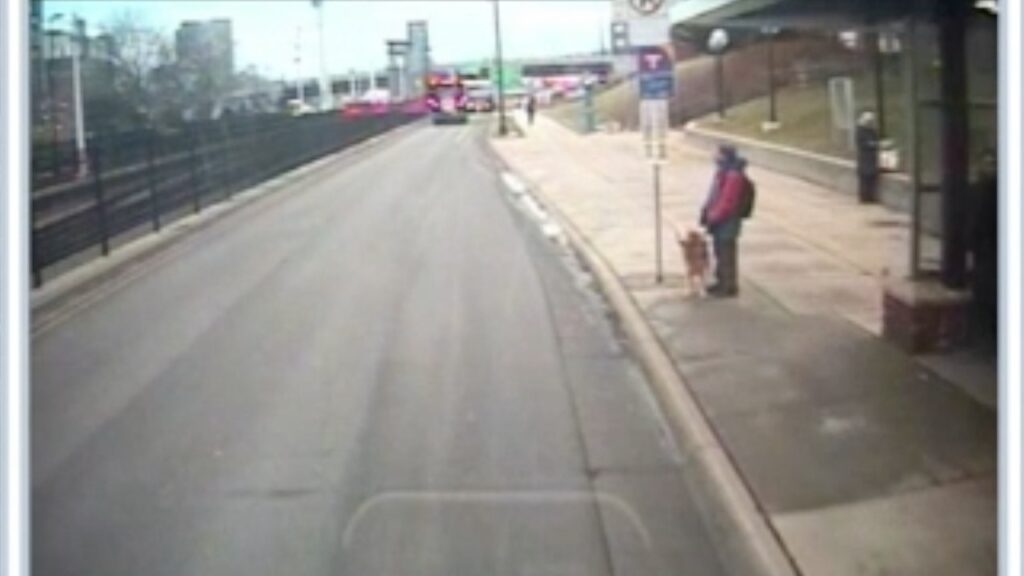Deaf, Blind and Ignored: Metro Transit repeatedly left man with disabilities at bus stop
The service dog or white cane were not enough to catch the attention of Metro Transit drivers as Barry Segal waited at the bus stop.
Segal is DeafBlind.
In order to safely catch the bus to get to and from his accounting job in St. Paul, he stood exactly where he was trained to wait.
But videos show that Metro Transit bus drivers repeatedly failed to stop where they were supposed to — ignoring their training — and sometimes Segal altogether.
Drivers left him waiting at the bus stop with his service dog or cane at least 23 times, according to court records provided to 5 INVESTIGATES by Segal’s attorney.
In another case, video confirmed Segal was forced to cross a busy intersection after the bus driver stopped across the street.
In less than three years, Segal complained more than 150 times.
But it kept happening.
“They felt that the bus drivers were trained well enough. Their response was, ‘It’ll be better next time,’” said Segal, who talked to 5 INVESTIGATES through a sign language interpreter.
“It was terrible discrimination. It left me feeling unsafe.”
Segal’s experience ultimately led to a lengthy legal battle, a recent six-figure settlement and new training at the state’s largest public transportation system.
“We’ve committed to do better,” said Brian Funk, the chief operating officer at Metro Transit.
The “T-Sign”
Segal suffers from multiple medical conditions, including optic atrophy — leaving him with extremely limited vision. He said he can only make out large shapes and the contrast between light and dark.
“The bus is very large, and when it’s coming, I can see that it’s there because of the size of it,” he said.
To safely get on the bus, Segal waited right next to what’s known as the “t-sign.” The red circle and capital “T” identifies bus stops across the Twin Cities.
“As I stand by the t-sign, I know that if I go forward, the pathway is clear and I’ll be safe,” Segal explained.

According to training records, bus drivers are taught to stop at that exact spot.
Transit officials later confirmed that drivers failed to follow that training nearly 75 times, according to court records.
“Our bus operator members are human and make mistakes,” said Ryan Timlin, President of the ATU Local 1005, which represents Metro Transit bus drivers.
Timlin said he can’t speak to the specifics of Segal’s lawsuit but added that it’s an issue they take seriously.
“We are not justifying what happened, but we can see how something like this could have occurred with the current staffing at Metro Transit.”
The agency issued several bulletins and reminders to bus drivers on the importance of stopping the bus at the sign.
“They just drive right by him”
But it still kept happening.
“They just drive right by him,” said Rick Macpherson with the Minnesota Disability Law Center.
In 2018, Macpherson and Segal filed a lawsuit claiming that Metro Transit violated not only their own policy but also the Americans with Disabilities Act.
“They seemed to take the approach that there was nothing they could do, and that wasn’t acceptable to Mr. Segal. And it wasn’t acceptable to us,” Macpherson said.
The lawsuit dragged on for years as the agency fought back against the allegations.
Last month, the agency settled the lawsuit for more than $400,000.
In an interview with 5 INVESTIGATES, Funk said Metro Transit’s service in this case fell short.
“It’s not what any of us expect,” he said. “It’s not what our operators want to do when they’re providing service.”
In addition to the previous bulletins and videos, Funk said Metro Transit is also now offering in-person sensory training for drivers.
Earlier this week, 5 INVESTIGATES was invited to watch one of the new experiential training seminars.
Drivers put on blindfolds and earplugs to better understand what some riders experience when trying to board or get off a bus.
“We’re training our operators that you stop there, and if you can’t, then there’s an expectation on you communicating with anyone who’s waiting,” Funk said. “We think that it’s going to be the right thing to just, frankly, do better.”
Segal said he plans to keep riding the bus, and he’s hopeful things will change.
“I’m also going to be watching to see that the bus drivers are following the rules that they have been trained, and they’re using their training,” he said.